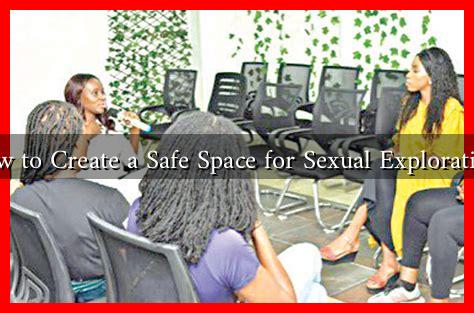-
Table of Contents
How to Create a Safe Space for Sexual Exploration
Sexual exploration is a vital aspect of human experience, contributing to personal growth, intimacy, and understanding of one’s own desires. However, the journey of sexual discovery can often be fraught with anxiety, fear, and societal stigma. Creating a safe space for sexual exploration is essential for fostering open communication, trust, and a sense of security. This article will guide you through the steps to establish such an environment, whether in a relationship, a community, or even within oneself.
Understanding the Concept of a Safe Space
A safe space is an environment where individuals feel secure, respected, and free to express themselves without fear of judgment or harm. In the context of sexual exploration, this means creating a setting where people can discuss their desires, boundaries, and experiences openly. According to a study published in the Journal of Sex Research, individuals who feel safe in their sexual environments are more likely to engage in healthy sexual practices and explore their sexuality positively.
Key Elements of a Safe Space
To create a safe space for sexual exploration, consider the following key elements:
- Open Communication: Encourage honest discussions about desires, boundaries, and fears. This can be facilitated through regular check-ins or open forums.
- Respect for Boundaries: Establish clear boundaries and ensure that everyone involved understands and respects them. Consent should always be prioritized.
- Non-Judgmental Attitude: Foster an environment where individuals can express themselves without fear of criticism. This can be achieved by actively listening and validating feelings.
- Education and Resources: Provide access to educational materials about sexual health, consent, and exploration. This can empower individuals to make informed decisions.
- Inclusivity: Ensure that the space is welcoming to all sexual orientations, identities, and experiences. This promotes diversity and enriches the exploration process.
Practical Steps to Establish a Safe Space
Creating a safe space for sexual exploration involves both physical and emotional considerations. Here are some practical steps to take:
- Set the Tone: Whether it’s a conversation with a partner or a group discussion, start by establishing a tone of respect and openness. Use “I” statements to express feelings and desires.
- Choose the Right Environment: Select a comfortable and private location for discussions or activities. This could be a cozy room at home or a designated space in a community center.
- Utilize Ground Rules: Before engaging in discussions or activities, establish ground rules that everyone agrees to follow. This could include confidentiality agreements and guidelines for respectful communication.
- Encourage Feedback: After discussions or activities, invite feedback to understand what worked and what could be improved. This helps to continuously refine the safe space.
- Seek Professional Guidance: Consider involving a therapist or counselor specializing in sexual health to facilitate discussions and provide expert insights.
Case Studies and Examples
Many organizations and communities have successfully created safe spaces for sexual exploration. For instance, the Planned Parenthood offers workshops and resources that empower individuals to explore their sexuality in a safe and informed manner. Similarly, LGBTQ+ community centers often provide safe spaces for individuals to discuss their sexual identities and experiences without fear of discrimination.
In a more personal context, couples who engage in open dialogues about their sexual preferences often report higher levels of satisfaction and intimacy. A study by the Kinsey Institute found that couples who communicate openly about their sexual desires are 50% more likely to report a fulfilling sexual relationship.
Conclusion
Creating a safe space for sexual exploration is essential for fostering healthy relationships and personal growth. By prioritizing open communication, respect for boundaries, and inclusivity, individuals can embark on their journeys of sexual discovery with confidence and security. Remember, the goal is to create an environment where everyone feels valued and empowered to express their true selves. As we continue to break down societal stigmas surrounding sexuality, the importance of safe spaces will only grow, paving the way for healthier, more fulfilling sexual experiences.


